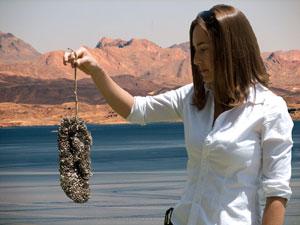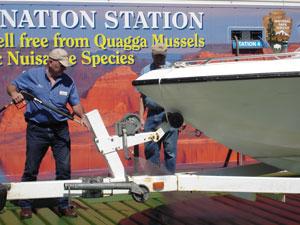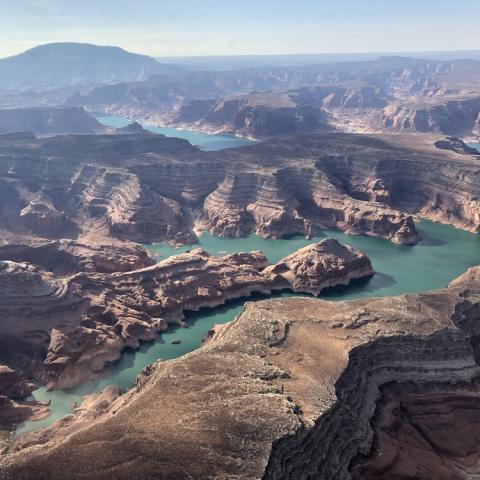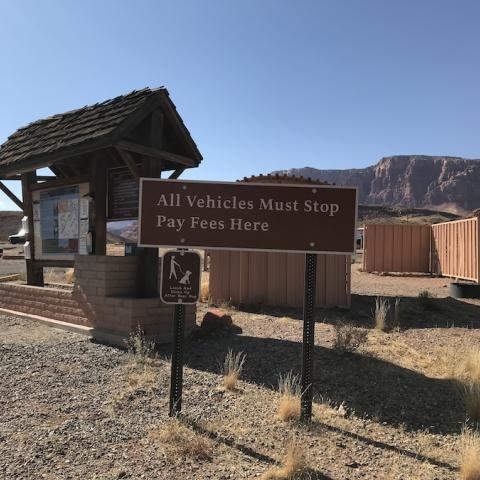There was both good and bad news from Glen Canyon National Recreation Area, where 14 adult quagga mussels have been found attached to moored vessels and dock structures in Lake Powell.
The word that the invasive pests have turned up in the big lake isn't good, but all is not yet lost in the battle to keep the invaders out of the lake. The encouraging news is none of the mussels were close enough together for successful reproduction.
In recent weeks, park staff have found the adult quagga mussels attached to moored vessels and dock structures at the Wahweap Marina in Lake Powell. The first four mussels were found when employees of a local marine service business noticed the small shells on a boat that had been pulled out of the water for maintenance; they then notified the National Park Service.
The park's dive team inspected boats, docks and cables in Wahweap Bay and found an additional ten adult mussels which were physically removed from the lake. Marina structures and vessels will continue to be monitored. The Antelope Point area was inspected beginning last December, with no mussels discovered.
Early Detection May Save the Day
"We really appreciate the report of this finding since it will help in the removal of the adult mussels before they can reproduce," said Mark Anderson, an aquatic ecologist at Glen Canyon. Superintendent Todd Brindle remains hopeful that the monitoring results are not evidence of an established population of mussels. "If it is an early detection, the mussels may not establish and reproduce," said Brindle.

The NPS has an active monitoring program to help keep Lake Powell free of quagga. NPS photo.
"It is important to note that we have not found a reproducing population," Anderson said. "Prevention is still the most effective way to fight invasive species, so we will continue the boat inspections that are currently in place. Everyone needs to take this as a warning to continue to clean, drain, and dry your boat and equipment after every use."
Even a Few Mussels Are a Big Concern
Why all the concern over just 14 small mussels?
Unless you've been impacted by the results of an infestation by these unwelcome animals, it's hard to fully appreciate how much damage they can cause, but they are serious trouble indeed.
Quagga mussels, and their close relatives called zebra mussels, reproduce quickly and in large numbers, typically creating large populations. Zebra Mussel densities have been reported to exceed 700,000 individuals per square meter in some facilities in the Great Lakes area. That's a number so large it's almost impossible to comprehend, but from a practical standpoint, it spells big trouble.
Tiny Mussels Cause Enormous Damage
An interagency website called Protect Your Waters includes a lengthy and sobering list of impacts of quaggas and similar invasive species on lakes and rivers: They ruin boat engines and jam steering equipment; dramatically increase the cost of operating drinking water plants, power plants, dams and industrial facilities; reduce populations of native species and game fish; and reduce property values and affect the economies of water-dependent communities. The pests can actually make bodies of water unusable by boaters and swimmers, so it's certainly worth the effort to try to prevent that from happening.
Perhaps this seems like a distant problem, but the financial impacts of quagga and zebra mussels can affect your pocketbook, even if you never spend any time around a lake or river. Costs of fighting the spread of the invasives along with repairs and cleaning of equipment and property are already running into the hundreds of millions of dollars across the country. In just one example of what's at stake, a U. S. Fish and Wildlife Service report warns if zebra and quagga mussels invade the Columbia River, they could cost hydroelectric facilities alone up to $250 to $300 million annually.

This flip-flop recovered from Lake Mead illustrates how densely quagga can cover any object in infested waters. NPS photo.
Over a Decade of Success at Lake Powell
In an effort to keep the pests out of Lake Powell, the NPS has operated a mussel prevention program at Glen Canyon National Recreation Area since 2000. Over a decade ago, scientists predicted that Lake Powell would be the first lake in the western U.S. to get mussels, but thanks to lots of hard work, and cooperation by the majority of boaters, the program has paid off thus far.
That cooperation by private boaters is the key to keeping any lake or river that isn't already infested free of the invaders. The immature form of the mussels can spread via boats to other inland waters, hidden in water carried in livewells, bilges, and motors; adult mussels may be attached to boat hulls, engines, aquatic weeds, or other surfaces. Boats which have been in the water in areas where quagga are already established are considered "high-risk boats."
Number of High Risk Boats at Lake Powell "Increasing Exponentially"
Keeping Lake Powell quagga-free hasn't been easy, and it's a time and labor-intensive process. According to a park spokesperson, the number of high-risk boats coming to the park has increased exponentially in the past few years.
Prior to 2007 and the discovery of mussels elsewhere in the western U.S., Lake Powell was threatened by about 50 high-risk boats per year from Eastern states. Now that quagga and zebra mussels are established in other Western waters, the number of high-risk boats coming to Lake Power grew to 17,000 in 2011. Last year, 38 boats with mussels were stopped from launching; that's over twice the number intercepted in 2011.
The increased pressure has required the park to screen boats to determine the highest risks and focus its limited capability where it is needed most. At busy times, as few as 15 percent of boats may actually get inspected, and that puts much of the burden of responsibility on boaters.
Biggest Concern May Be Boater Apathy
Are individual visitors who bring their boats to the lake taking the situation as seriously as they should?
An entry on the park website notes, "Mussel prevention efforts are commonly hampered by apathy, borne out of a sense of inevitability," but the successes of the past decade at Lake Powell and in other areas have shown that spread of the problem is not inevitable, and there are good reasons why that's the case. "Downstream transport of zebra mussel veligers (larvae) in highly sediment laden rivers like the Colorado and San Juan has never been demonstrated. Inflow areas of Lake Powell are not well-suited habitat for mussels."

Decontaminating a boat at Lake Powell. NPS photo.
Simply stated, that means the mussels are unlikely to become established in Lake Powell unless they "hitchhike" a ride on a boat. It only takes one contaminated boat to do tremendous harm, but not every infested boat will successfully spread a reproducing mussel population, and it's hoped that will prove to be the situation with the recent discoveries at Lake Powell.
"Every year that even just a part of a water body goes without mussels is valuable,
notes a park publication. "Every year is closer to having better tools available to deal with (or even eradicate) infestations."
Prevention is the Only Solution to this Problem
Efforts such as those at Glen Canyon NRA to prevent the introduction of quagga into the lake are critical because they are the only current solution to containing the problem.
According to the Aquatic Nuisance Species Task Force, "There is no known method of eradication once zebra or quagga mussels have established in a large water body.... Since zebra and quagga mussels have planktonic (free drifting) larvae, preventing spread to water bodies downstream from known infestations may not be possible. However, there is evidence to suggest that overland spread is largely due to trailered boat traffic. Thus, further spread of zebra and quagga mussels is highly preventable."
Bottom line: If you're a boater, it's ultimately your responsibility to clean and inspect your boat, and you have a lot to gain'and plenty to lose in this battle.
You'll find more information about the program to keep Lake Powell free of quagga at this link. If you're a boater planning a trip to the park, it's important that you are familiar with launch ramp hours and requirements for screening boats prior to launch.




 Support Essential Coverage of Essential Places
Support Essential Coverage of Essential Places






